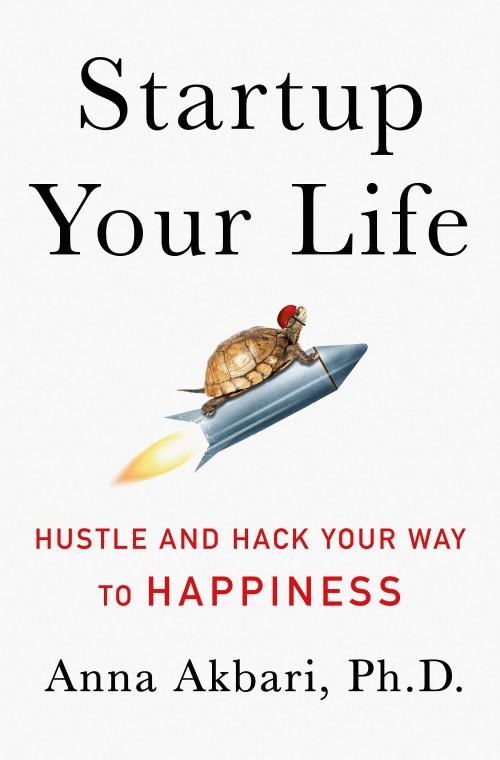Hack Your Way To Happiness By Thinking Like A Startup

As an entrepreneur, Dr. Anna Akbari learned that success is all about “pivoting” – experimenting, failing, and moving forward.
In her book, Startup Your Life: Hustle And Hack Your Way To Happiness, she draws on startup methodology and anecdotes to help readers reclaim control and happiness over their lives. Accompanying the book is an online video series, which offers interactive exercises and access to Anna via private forum.

Her Agenda connected with Dr. Anna Akbari to learn more about how we can hack our way to happiness.
Her Agenda: What inspired you to write Startup Your Life?
Dr. Anna Akbari: One of the things I wanted to address was the gap in the self-help marketplace. I often had trouble connecting with some of the books and the gurus that were out there because a lot of them don’t take a practical approach. I mean, it’s great to have someone operate as a cheerleader, but sometimes you need to have a more concrete toolkit for reframing your life and the way you operate. That was one of the things I was trying to do, and I also wanted to be a sort of guru that people can relate to, not someone who has always led this perfect life.
Her Agenda: What would you describe as your first entrepreneurial venture?
Dr. Anna Akbari: Well, when I was in early grad school, one of my peers and I launched a company called Brainwright. We both had an arts background and were passionate about the arts and arts education. We knew that at that time, a lot of artists were struggling in New York City and couldn’t pay their bills. We thought there was an opportunity for people to hire them as instructors. So, we created Brainwright, an online bulletin board for these different artists (actors, musicians, flower arrangers) that were underemployed. I mean, our acting coach was Ty Burrell, who’s now the star of Modern Family. This was the level of people we were operating with.
We didn’t end up continuing – the financials were just too difficult, we didn’t have an investor, we were both very young, and it was our first venture. But, at that point, I started to think of business and entrepreneurship very differently. This experience taught me that entrepreneurship was a place to exercise creativity and for actualizing ideas. From that point onward, I was interested in living my life in an entrepreneurial way.
Her Agenda: We live in a world where technology is everywhere. How we do maintain “digital happiness” in this constantly connected world?
Dr. Anna Akbari: This is a question I get a lot when I’m presenting to groups. One of the first things I say is to create boundaries that are flexible. A lot of people fall into one of two camps: they either feel they should always be on and there’s no exceptions, or they take the other approach where they create very rigid boundaries. What I mean by creating boundaries that are flexible is by saying you’re not available after a certain time, but then also not being tone deaf to the reality of whatever project you happen to be working on. This is an entrepreneurial approach in that there are moments where there is a time crunch and it’s all hands on deck at that moment. But afterward, you rebalance. That shouldn’t be a permanent way of life. So, being flexible is the best way to both create balance and demonstrate that you are willing to go the extra mile and hustle.
Her Agenda: What do you do to recharge?
Dr. Anna Akbari: Well, I have found that increasingly over time I need direct access to nature as often as possible. Being in or near the ocean. Being in trees. Going for a run. Going for a hike. That is the fastest, best way for me to recharge.
Additionally, I also create “play outlets.” That’s something I talk about in the book. Whether I’m roller skating, singing karaoke, or hosting a dinner party – these are social, joyful things that I make time for in my life.
Her Agenda: The last couple weeks have been extremely tumultuous. What coping strategies can we use to make sense of this brave new world?
Dr. Anna Akbari: Well, we can’t ignore it, but we also have to accept the fact that we don’t have complete control all the time. That’s something I talk about in the beginning of the book – this acceptance of a lack of control in certain areas and then claiming control in others. Identify the ways you can positively affect the world and the communities you inhabit and touch, whether that means demonstrating, running for office yourself, calling your congressman or senators, or having thoughtful conversations. Whatever it is that you can personally do is empowering and an important coping mechanism. If we just monitor social media and despair, that doesn’t actually soothe us very much.
Her Agenda: Do you have any last words of wisdom?
Dr. Anna Akbari: Identify the things in your life that you can control and make you truly happy. Focus on those and create a space for there to be experimentation, improvisation, and room for failure. One of the questions I pose in the book is “What is it that you are seeking, and are you allowing it to find you?” That’s something many people can’t answer. Give yourself space to think about that, whether it’s through exploring nature or doing some kind of playtime activity that lets you imagine a world beyond your immediate surroundings. That’s the first step in finding joy – giving yourself permission to daydream and commit to those things that make you happy that might not always be the most immediately productivity-oriented classical choices.






